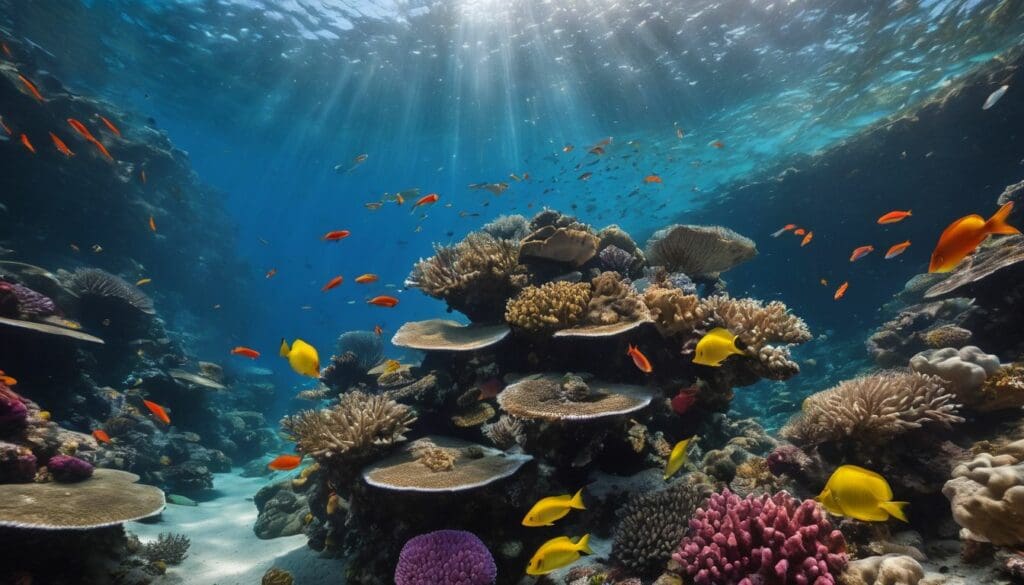When we sit down to dine, with a lovely bit of fish on our plate, it’s easy to forget that there’s an entire underwater world connected to that meal. It’s not just about savouring the flavours; it’s also a matter of concern for our oceans’ health – and I’m sure you’re aware, much like us, that overfishing is no small issue.
Astonishingly enough, a third of fish stocks are being depleted faster than they can replenish. Delving deeper into this topic has unveiled quite the intricate web linking the state of our seas directly to our own wellbeing.
As you read through these lines, consider how each choice at the seafood counter extends beyond taste and into responsibility. Let’s embark on this journey together and cast wide nets for solutions – after all, securing a future where marine life thrives will be quite the catch for us all!
Key Takeaways
- Overfishing endangers marine ecosystems and depletes stocks, affecting food security for coastal communities.
- Sustainable aquaculture and responsible fisheries management are vital to preserve ocean biodiversity and provide future fish supplies.
- Illegal fishing practices harmfully impact social and environmental justice, hitting hardest in developing nations.
- Marine reserves protect against overexploitation by providing safe environments for species to recover.
- Consumer choices have power; choosing sustainably sourced fish supports the health of oceans and those who depend on them.
Overfishing: A Threat to Human Health
Increased fish consumption has led to concerns about the health implications of overfishing, as well as the benefits and risks of eating fish. The impact on marine ecosystem health is also a significant factor to consider in relation to human health.
Increased fish consumption
Eating more fish seems like a healthy choice for many of us. It’s packed with important nutrients, such as omega-3 fatty acids, which support brain and heart health. However, our growing appetite for seafood is driving up demand at an alarming rate.
This puts tremendous pressure on fish populations around the globe.
We must acknowledge that this surge in consumption has direct consequences on marine ecosystems. Many species are being fished faster than they can reproduce, leading to dwindling numbers and disruption of ecological balance.
The sustainability of our actions is crucial; otherwise, we jeopardise not just ocean health but also the food security and economic stability of coastal communities that rely heavily on fishing.
Benefits and risks of eating fish
Increased fish consumption can have both positive and negative impacts on our health. Fish is a great source of lean protein, omega-3 fatty acids, vitamins, and minerals that are essential for our overall well-being and heart health.
However, some types of fish may contain high levels of mercury or other contaminants that can pose health risks if consumed in large quantities. It’s important to be mindful of the types of fish we consume and their potential impact on our health.
We must be aware of the benefits that come with consuming fish while also being cautious about the potential risks associated with certain species. Understanding the nutritional value and potential contaminants in different types of fish can help us make informed choices that support both our personal health and the sustainability of marine ecosystems.
Impact on marine ecosystem health
Overfishing significantly impacts marine ecosystem health, leading to declining fish stocks, habitat destruction, and loss of biodiversity. Unregulated and illegal fishing practices contribute to the overexploitation of marine resources, causing ecological disruption and degradation.
Marine habitat destruction also affects coastal communities that rely on healthy marine ecosystems for their livelihoods.
The decline in fish populations due to overfishing has far-reaching consequences for ocean conservation and sustainable fishing practices. It is imperative to address these issues through responsible fisheries management, promoting sustainable fishing methods, and advocating for environmental protection measures.
By considering the impact of overfishing on marine ecosystem health, we can work towards preserving aquatic resources for future generations.
The Status of World Fisheries and Aquaculture
The status of world fisheries and aquaculture is concerning, with overfishing leading to a peak fish situation. Without proper management, the depletion of fish stocks will have significant impacts on marine ecosystems and coastal communities.
Peak fish
The status of world fisheries and aquaculture is a matter of concern, particularly in relation to the concept of “peak fish.” As we continue to harvest from the oceans at unsustainable rates, there is a risk that we may reach a point where the maximum wild catch has been achieved.
This could have significant implications for marine biodiversity and ecosystem health. It’s essential for us to address this issue through responsible fisheries management and sustainable practices to ensure that we can continue to enjoy the benefits of seafood without depleting our ocean resources.
Furthermore, understanding peak fish also highlights the need to support initiatives promoting sustainable aquaculture. By diversifying our sources of seafood and reducing reliance on wild catches, we can help alleviate pressure on vulnerable fish populations while meeting global demand for fish products.
Fisheries management
To address overfishing and its impacts, responsible fisheries management is crucial. This involves regulating fishing activities to ensure sustainable yields and protect marine biodiversity.
Implementing effective quotas and monitoring systems can help prevent fish depletion and ecosystem degradation. By promoting sustainable fishing practices, we can mitigate the environmental impact of unregulated fishing and safeguard marine ecosystems for future generations.
Furthermore, collaboration between governments, scientists, and local communities is essential in establishing policies that consider the impact on coastal communities. By addressing overfishing consequences at a global level through coordinated efforts, we can work towards ensuring food security while preserving marine biodiversity for the benefit of all.
Aquaculture prospects
Aquaculture offers a promising solution to overfishing by providing an alternative source of seafood. It presents opportunities for sustainable fish farming, reducing pressure on wild fish populations and promoting marine biodiversity conservation.
By embracing responsible aquaculture practices, we can help meet the increasing global demand for seafood while safeguarding our ocean ecosystems from further depletion.
Embracing the potential of aquaculture requires us to support ethical and environmentally friendly fish farming methods. This includes advocating for regulations that ensure minimal impact on marine biodiversity and ecosystems.
Sustainable aquaculture initiatives align with our commitment to preserving marine life, offering hope for a more balanced and secure future for both our health and the environment.
The Environmental and Economic Impacts of Overfishing
Overfishing poses a significant threat to marine biodiversity and ecosystems, leading to decreased food and economic security while also impacting social and environmental justice.
To learn more about the implications of overfishing, read on for potential solutions and the importance of responsible fisheries management.
Threats to biodiversity and ecosystems
Overfishing poses a significant threat to marine biodiversity, leading to the depletion of various fish species and disrupting delicate ecosystems. This loss of biodiversity can have widespread consequences, impacting the balance of marine food chains and reducing the overall resilience of ocean environments.
As a result, overfishing can lead to irreversible damage in some cases, contributing to the decline of certain species and altering the natural dynamics that support healthy ecosystems.
Furthermore, overfishing not only affects specific fish populations but also disrupts the interconnected web of life in oceans. The resulting imbalance can cause cascading effects throughout marine ecosystems, affecting other organisms such as seabirds, marine mammals, and even coral reefs.
Decreased food and economic security
Overfishing contributes to decreased food and economic security by depleting fish stocks, threatening the livelihood of fishing communities and reducing food availability. This not only impacts coastal economies but also jeopardises global food supplies, particularly for vulnerable populations that rely heavily on fish as a primary protein source.
As marine biodiversity declines due to overfishing, the reduction in fish abundance directly affects local fishermen and seafood industries, leading to job losses and economic instability within these communities.
In addition to the direct effects on fisheries, overfishing also disrupts marine ecosystems and their ability to provide essential services such as nutrient cycling and coastal protection.
This disruption further impacts the livelihoods of those dependent on ocean resources while creating greater economic vulnerability for countries whose economies are reliant on fisheries.
Effects on social and environmental justice
Overfishing undermines social and environmental justice by threatening the livelihoods of coastal communities reliant on fisheries. It perpetuates poverty, decreases food security, and exacerbates economic disparities, particularly in developing nations.
At the same time, overfishing leads to marine biodiversity loss, affecting ecosystems and depriving future generations of essential resources.
Illegal fishing practices further compound these injustices by disregarding regulations designed to protect vulnerable marine species. Additionally, subsidies that support overcapacity in the fishing industry contribute to unfair competition for small-scale fishers.
Potential Solutions to Overfishing
Implementing marine reserves and ecosystem management can help restore fish populations and protect vulnerable species. Promoting sustainable aquaculture practices also offers a promising solution to alleviate the pressure on wild fish stocks.
Addressing illegal fishing and reducing harmful fishing subsidies are essential steps towards creating a more sustainable future for our oceans.
Marine reserves and ecosystem management
To protect marine ecosystems, we establish marine reserves. Within these areas, all fishing and other extractive activities are prohibited, allowing fish populations and their habitats to recover.
Additionally, effective ecosystem management involves understanding the interconnections between different species and environmental factors in order to make informed decisions that sustain biodiversity and ecosystem health.
Implementing marine reserves facilitates the restoration of marine environments by providing safe havens for vulnerable species. Ecosystem management ensures a holistic approach to protecting our oceans, safeguarding not only the environment but also the long-term availability of fish for consumption.
Promoting sustainable aquaculture
After considering the benefits of marine reserves and ecosystem management, it’s essential to address the promotion of sustainable aquaculture. Sustainable aquaculture plays a critical role in meeting the increasing global demand for seafood while alleviating pressure on wild fish stocks.
By implementing best practices such as responsible feed sourcing, efficient water use, and minimal environmental impact, sustainable aquaculture can provide a reliable source of high-quality seafood without compromising the health of marine ecosystems.
Embracing sustainable aquaculture ensures that future generations will continue to enjoy the nutritional and economic benefits of seafood consumption without depleting natural resources.
Furthermore, environmentally conscious individuals can support conservation efforts by choosing responsibly sourced farmed fish products from reputable suppliers. This action not only promotes sustainability but also contributes to healthier oceans and supports communities dependent on fishing for their livelihoods.
Addressing illegal fishing and fishing subsidies
To further address the threats posed by overfishing, it is imperative to tackle illegal fishing and fishing subsidies. Taking action against these activities is crucial in promoting sustainable fisheries management and preserving marine ecosystems. Here are some effective measures to address illegal fishing and fishing subsidies:
- Strengthening enforcement and monitoring efforts to combat illegal, unreported, and unregulated (IUU) fishing.
- Implementing traceability systems to track seafood from catch to consumption, deterring illegally caught fish from entering the market.
- Enforcing regulations on fishing subsidies to discourage overfishing and promote sustainable practices.
- Collaborating with international organisations and governments to develop policies that effectively regulate fishing activities.
- Increasing transparency in the fishing industry by disclosing information about vessel ownership, catch data, and operating practices.
Conclusion: Balancing the Health Benefits and Risks of Fish Consumption
In conclusion, it is essential to strike a balance between the health benefits and risks of fish consumption. Responsible fisheries management and consumer choices play a crucial role in ensuring the sustainability of our marine resources and considering their environmental and social impacts.
The need for responsible fisheries management and consumer choices
Responsible fisheries management and consumer choices play a crucial role in sustaining healthy fish populations and marine ecosystems. By supporting sustainable fishing practices, we can help protect the biodiversity of our oceans and ensure that future generations have access to vital food resources.
Additionally, making informed consumer choices, such as opting for sustainably caught or farmed seafood, helps drive market demand towards responsible fishing practices, contributing to the overall health of our oceans.
Promoting awareness about responsible fisheries management among consumers empowers individuals to make environmentally conscious decisions when purchasing seafood products. This ultimately creates a positive impact on marine conservation efforts and supports the long-term sustainability of our ocean resources.
Importance of considering environmental and social impacts of overfishing.
Considering the environmental and social impacts of overfishing is crucial for maintaining healthy marine ecosystems and protecting the livelihoods of coastal communities. By acknowledging these impacts, we can work towards sustainable fishing practices that support biodiversity and ensure a steady supply of fish for future generations.
It’s important to understand how overfishing affects not only the health of our oceans but also the economic stability and food security of communities that rely on seafood as a primary source of nutrition.
Furthermore, taking into account the environmental and social consequences helps us make informed decisions about the fish we consume, supporting conservation efforts and promoting ethical fishing practices.
FAQs
1. What happens to our health when overfishing occurs?
When overfishing occurs, our access to healthy seafood declines, which can affect nutrition and food security.
2. Can overfishing lead to a shortage of certain types of fish?
Yes, overfishing can cause a shortage of some types of fish that are important for a balanced diet.
3. Does the reduction in fish populations impact our diets?
The reduction in fish populations from overfishing impacts diets by limiting the variety and availability of seafood.
4. Are there any risks from eating too much fish that comes from overfished areas?
Eating too much fish from overfished areas may expose you to higher levels of contaminants due to disrupted ecosystems.
5. How does preserving marine life through sustainable fishing benefit our health?
Preserving marine life through sustainable fishing ensures a continuous supply of nutritious seafood for healthier eating habits.





